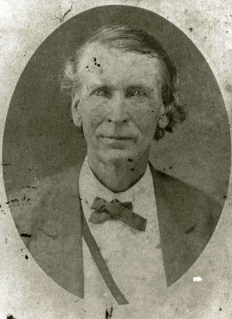
The Battle of Brice's Cross Roads was fought on Friday, June 10, 1864, near Baldwyn, Mississippi, then part of the Confederate States of America. A Federal expedition from Memphis, Tennessee, of 4,800 infantry and 3,300 cavalry, under the command of Brigadier-General Samuel D. Sturgis, was defeated by a Confederate force of 3,500 cavalry under the command of Major-General Nathan B. Forrest. The battle was a victory for the Confederates. Forrest inflicted heavy casualties on the Federal force and captured more than 1,600 prisoners of war, 18 artillery pieces, and wagons loaded with supplies. Once Sturgis reached Memphis, he asked to be relieved of his command.

Confederate Memorial Day is a cultural holiday observed in several Southern U.S. states on various dates since the end of the Civil War to remember the estimated 258,000 Confederate soldiers who have died in military service.

James Harrison Wilson was a United States Army topographic engineer and a Union Army Major General in the American Civil War. He served as an aide to Maj. Gen. George B. McClellan during the Maryland Campaign before joining Maj. Gen. Ulysses S. Grant's army in the Western Theater, where he was promoted to brigadier general. In 1864, he transferred from engineering to the cavalry, where he displayed notable leadership in many engagements of the Overland Campaign, though his attempt to destroy Lee’s supply lines failed when he was routed by a much smaller force of Confederate irregulars.

The Commercial Appeal is a daily newspaper of Memphis, Tennessee, and its surrounding metropolitan area. It is owned by the Gannett Company; its former owner, the E. W. Scripps Company, also owned the former afternoon paper, the Memphis Press-Scimitar, which it folded in 1983. The 2016 purchase by Gannett of Journal Media Group effectively gave it control of the two major papers in western and central Tennessee, uniting the Commercial Appeal with Nashville's The Tennessean.

Howell Cobb was an American political figure. A southern Democrat, Cobb was a five-term member of the United States House of Representatives and Speaker of the House from 1849 to 1851. He also served as the 40th Governor of Georgia (1851–1853) and as a Secretary of the Treasury under President James Buchanan (1857–1860).
The Battle of West Point, Georgia, formed part of the Union campaign through Alabama and Georgia, known as Wilson's Raid, in the final phase of the American Civil War.

The Western Theater of the American Civil War encompassed major military operations in the states of Alabama, Georgia, Florida, Mississippi, North Carolina, Kentucky, South Carolina and Tennessee, as well as Louisiana east of the Mississippi River. Operations on the coasts of these states, except for Mobile Bay, are considered part of the Lower Seaboard Theater. Most other operations east of the Mississippi are part of the Eastern Theater. Operations west of the Mississippi River took place in the Trans-Mississippi Theater.
Wilson's Raid was a cavalry operation through Alabama and Georgia in March–April 1865, late in the American Civil War. Brig. Gen. James H. Wilson led his Union Army Cavalry Corps to destroy Southern manufacturing facilities and was opposed unsuccessfully by a much smaller force under Confederate Lt. Gen. Nathan Bedford Forrest.

William Wirt Adams was a banker, planter, slave-owner, state legislator, and Brigadier-General in the Confederate States Army.

Georgia was one of the original seven slave states that formed the Confederate States of America in February 1861, triggering the U.S. Civil War. The state governor, Democrat Joseph E. Brown, wanted locally raised troops to be used only for the defence of Georgia, in defiance of Confederate president Jefferson Davis, who wanted to deploy them on other battlefronts. When the Union blockade prevented Georgia from exporting its plentiful cotton in exchange for key imports, Brown ordered farmers to grow food instead, but the breakdown of transport systems led to desperate shortages.

Marcus Joseph Wright was a lawyer, author, and a Confederate general in the American Civil War. He was agent for collection of Confederate records for War of the Rebellion: Official Records of the Union and Confederate Armies, a U.S. War Department publication.

Little Rebel was a cotton-clad ram that had been converted from a Mississippi River steamer to serve as the flagship of the Confederate River Defense Fleet in the American Civil War. Sent from New Orleans to defend against the Federal descent of the Mississippi, she was among the force that engaged vessels of the Union Army's Western Gunboat Flotilla at the Battle of Plum Point Bend on May 10, 1862. On June 6, she again was involved in an action with the Federal gunboats, this time at the Battle of Memphis. In the battle, a shot from a Federal gun pierced her boiler, disabling her, and she was then pushed aground by the Federal ram USS Monarch and captured.
USS Sumter was a 525-ton sidewheel paddle steamer captured by the Union Navy during the Union blockade of the American Civil War.

The 4th Arkansas Infantry was a Confederate Army infantry regiment from the state of Arkansas during the American Civil War. The 4th Arkansas served throughout the war in the western theater, seeing action in the Kentucky, Tennessee and Georgia campaigns. Following its depletion in numbers the regiment was consolidated several times with other Arkansas regiments, finally merging in 1865 into the 1st Arkansas Consolidated Mounted Rifles. Another Arkansas unit also had the designation 4th Arkansas, the 4th Regiment, Arkansas State Troops which participated in the Battle of Wilson's Creek, but was never transferred to Confederate Service. There is no connection between the two units.

The surrender of the Confederacy commenced with the surrender of the Army of Northern Virginia on April 9, at Appomattox Court House, by General Robert E. Lee and concluded with the surrender of the Shenandoah on November 6, 1865, bringing the hostilities of the American Civil War to a close.

Richard H. Cosgriff, Sr., was a Union Army soldier in the American Civil War and a recipient of the United States military's highest decoration, the Medal of Honor. An Irish immigrant, his family eventually settled in Wisconsin, where he would spend most of the rest of his life. Enlisting in an Iowa cavalry regiment, he was awarded the Medal of Honor for capturing a Confederate battle flag during an engagement in the last month of the war. After returning to Wisconsin, he worked as a businessman in the lumber and printing industries until his death at age 64.
The Battle of Columbus, Georgia, was the last conflict in the Union campaign through Alabama and Georgia, known as Wilson's Raid, in the final phase of the American Civil War.
The Confederate Congress created the position of Quartermaster-General on 26 Feb 1861 and the Secretary of War was allowed one Colonel and six Majors to serve as Quartermasters. The first Quartermaster General was Col. Abraham C. Myers; his appointment would appear to have been a foregone conclusion as he was signing himself as Acting Quartermaster General on 2 January 1861. In May 1861 when the Confederate government moved to Richmond, Virginia, the headquarters of the Quartermaster General were located on the corner of Ninth and Main Street.

Ira Roe Foster was born along the Tyger River, in Spartanburg County, South Carolina. He was a teacher, medical doctor, attorney, soldier, businessman, and politician. During the 1840s, Foster served as brigadier general in the Georgia Militia.

Mary Ann Williams was an American woman who was the first proponent for Memorial Day, an annual holiday to decorate soldiers’ graves.















